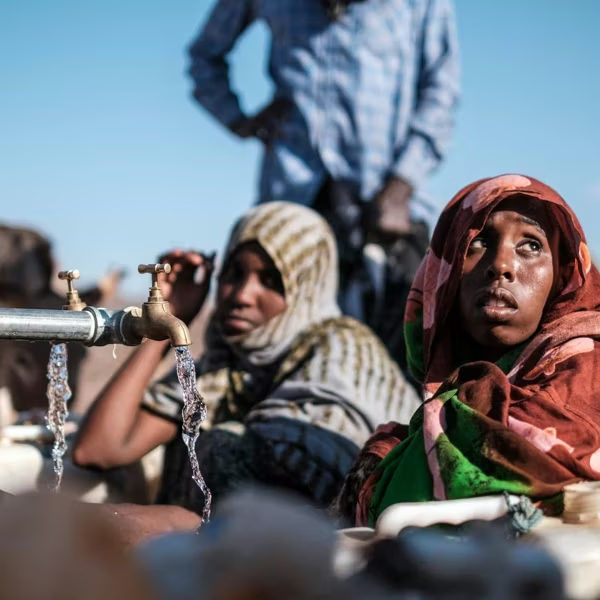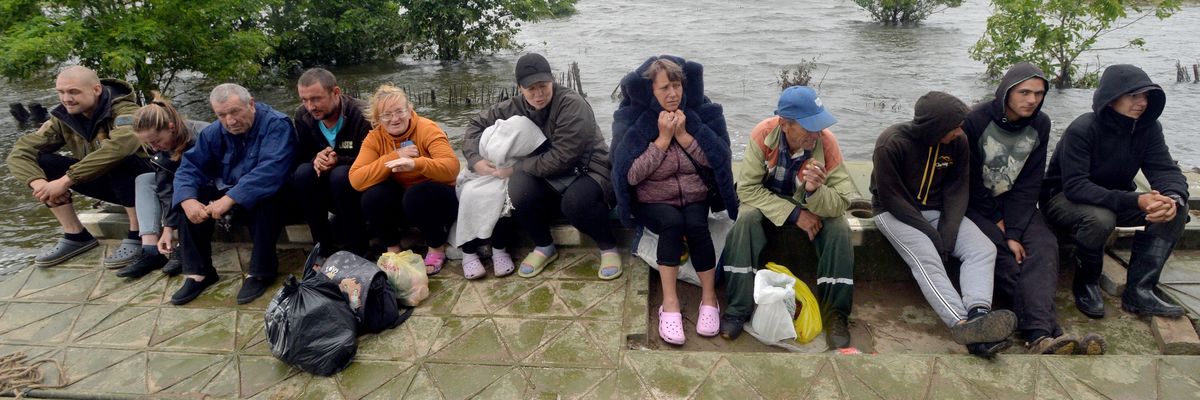A global think tank said Wednesday that it has been alarmed by recent updates to its records on water-related conflicts, which now show a significant spike in violence breaking out over water access in 2022, following a steady increase over the past two decades.
The Pacific Institute, which regularly updates its Water Conflict Chronology, reported that at least 228 water conflicts were recorded in 2022—an 87% increase over 2021—driven in large part by Russia's invasion of Ukraine.
Russian forces attacked water pipelines and supply systems in a number of Ukrainian cities after invading in February 2022, targeting water resources a total of 56 times since the war began.
Dozens of civil society groups called the destruction of the Kakhova hydropowered dam in Kherson "an act of ecocide" after the attack inundated at least 50 towns, cut off water to 500,000 hectares of farmland, and killed more than 50 people. Russia and Ukraine have blamed each other for the dam's collapse.
"The extensive attacks on dams and water delivery systems in Ukraine have contributed to the recent dramatic increase in water-related violence," said Peter Gleick, co-founder and senior fellow of the Pacific Institute.
But aside from violence geopolitical conflicts, Gleick said, "violence associated with water scarcity" is being "worsened by drought, climate disruptions, growing populations, and competition for water."
The group's chronology found that despite the high-profile attacks on water resources in Ukraine, incidents are "disproportionately concentrated in the Middle East, southern Asia, and Africa," particularly as intense competition and rising demand for water supplies are exacerbated by planetary heating.
Currently, Israel's total blockade and bombardment of Gaza has left the enclave's 2.3 million residents facing severe water shortages. Israel's decision to cut off fuel and electricity access has caused water desalination plants to cease operations, fueling a rise in infectious diseases and fears that even more severe water-borne illnesses, like cholera, will soon take hold.
Before Israel's most recent escalation in the occupied Palestinian territories, the country's military demolished numerous water wells and supply lines last year in the West Bank. Settlers also flooded Palestinian lands with wastewater and sabotaged wells.
In sub-Saharan African countries including Burkina Faso, Mali, Ethiopia, Nigeria, Somalia, and Kenya, violence has escalated in recent years between ranchers, farmers, and herdsmen as competition for water and land resources intensifies.
One-third of the world's droughts occur in the region, and in 2022 Ethiopia, Kenya, and Somalia were especially hard-hit by the Horn of Africa's worst drought in four decades. At least four people in Somalia were killed last year in disputes over water resources, and in Kenya, at least 10 people were killed in fighting over watering points and pasture lands.
"We're seeing the effects of years of poor water resources management—due to politics, lack of financial resources, debt, corruption, conflict, or other priorities—together with the effects of climate change, and this is leading to more intense competition over water resources," said Liz Saccoccia, a water security associate at the World Resources Institute, told The Guardian.
The report comes days after the United Nations Children's Fund (UNICEF) released a report titled The Climate Changed Child, detailing how 1 in 3 children—739 million—face water scarcity, with countries including Yemen, Burkina Faso, a Namibia among the most affected.
With wealthy countries like the United States and the United Kingdom showing no sign of halting their support for the extraction of planet-heating fossil fuels, 35 million more children—particularly in the Middle East, North Africa, and South Asia—are expected to be exposed to "high or very high levels of water stress" by 2050.
In an opinion piece at The Guardian, Gleick noted that "although there is plenty of water on Earth, it is unevenly distributed in space and time, with humid and arid regions as well as wet and dry seasons."
The United Nations prohibits the use of water as a weapon of war, and recognizes access to water as a human right—but to ensure that right is afforded to all, said Gleick, "the international community and local governments must act."
"Technologies and policies that improve water-use efficiency, cut waste, and expand water recycling and reuse can enable us to grow more food and strengthen our economies while using less water and reducing environmental degradation," he wrote. "It must be unequivocally stated that attacking civilian water systems and using water as a weapon are war crimes. Politicians and military leaders should be constantly reminded of these laws, and violations should be prosecuted."
The Pacific Institute said that 2023 is set to be another record-breaking year for attacks on water resources, following 2022's unprecedented spike.
"Protecting civilian water infrastructure and resources and developing water-governance structures that are just and equitable are necessary for both peacebuilding and peacekeeping," said Morgan Shimabuku, senior researcher at the Pacific Institute. "Water can be part of the solution, and in many places, it is a critical part."




